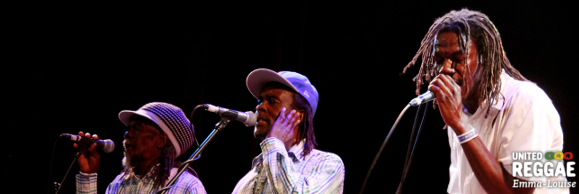Articles about reggae music, reviews, interviews, reports and more...
Culture in London

Culture in London
These songs deserve to continue.
“I decided my father’s work should go on. We will be chanting reggae music forever and ever” promised Kenyatta Hill, son of the late Joseph, once engineer for the harmony trio Culture, now its lead-singer. Judging by the decent sized gathering at the Islington Assembly Hall on the kind of cold day that can decimate a crowd for a London reggae show, it seemed the group’s fans agreed.
The Assembly Hall, as its name suggests, is not designed for live music. The sound is booming and hall-ish and dancing upon its notoriously bouncy wooden floor can leave punters feeling a little seasick. And there was bouncing a plenty as Kenyatta, along with delicate harmonies from original Culture member Albert Walker and 15 year stalwart Telford Nelson revisited some of the greatest songs from what the younger Hill called “My father’s cat”. The audience – including an unusually high number of London musicians – responded warmly to International Herb, Blood In A Babylon, Fussing and Fighting and many others besides.

Hill is not the same sinuous wild-eyed mover as his dad (who seemed to be floating on air under his bou bou robes). Taller and more imposing in build, he was a less mobile, commanding rather than beguiling presence: staying within the confines of centre stage, cupping his hand to his ear if he felt the reserved British crowd were not shouting loudly enough. His own voice had the familial nasal vulpine tone but with the throaty rockstone of a dancehall deejay – as demonstrated when he took Money Girl into an up-tempo verse. None of this dishonoured the memory of his father - who throughout his later life remained contemporary, working with the likes of Richie Spice and shouting “More fire!” during shows.
The downside to this pragmatic modernity was that Culture rarely toured with a horn section in their later years, and tonight was no different. Second keyboardist Ras Peanut should have been allowed to play more of his excellent original solos rather than mimic iconic brass parts such as those of uplifting hymn Jah Rastafari (when his instrument had to be unplugged due to technical problems, it was apparent that these were not needed). The band’s heart was its rhythm section. Jahmel Ellison of the Rasites provided suitably buoyant bass to Too Long In Slavery, while the ever-smiling drummer Rim Bim’s fire-cracking shots earned him an ovation at the end of the night.
“When my father passed away these brothers and my mother were there for me” was Hill’s poignant appraisal of Albert and Telford during an extended jazz coda of Two 7s Clash. Having played for over an hour they then returned for Love Shines Brighter, Addis Ababa and I’m Not Ashamed. The lack of brass was again felt (the support act Subajah Family collective’s Brassika Horns could have joined in) albeit no more so than when Joseph was with the group. Of course, Culture will never be quite the same without him, but this much is clear: these songs do deserve to continue and who better to present them than the lineup that tours today?
Comments actually desactivated due to too much spams
Browse by categories
Recommended Articles
Latest articles
Recently addedView all
© 2007-2026 United Reggae. All Rights Reserved. Reproduction in whole or in part is prohibited. Read about copyright
Terms of use | About us | Contact us | Authors | Newsletter | A-Z









































